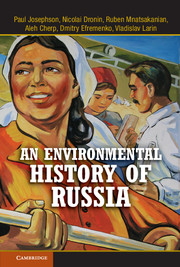Book contents
- Frontmatter
- Contents
- Introduction
- 1 From Imperial to Socialist Nature Preservation
- 2 Stalinism
- 3 The Khrushchev Reforms, Environmental Politics, and the Awakening of Environmentalism, 1953–1964
- 4 Developed Socialism, Environmental Degradation, and the Time of Economic “Stagnation,” 1964–1985
- 5 Gorbachev's Reforms, Glasnost, and Econationalism
- Conclusion After the Breakup of the Soviet Union
- Index
- References
Introduction
From Geographic Determinism to Political and Economic Factors
Published online by Cambridge University Press: 05 April 2013
- Frontmatter
- Contents
- Introduction
- 1 From Imperial to Socialist Nature Preservation
- 2 Stalinism
- 3 The Khrushchev Reforms, Environmental Politics, and the Awakening of Environmentalism, 1953–1964
- 4 Developed Socialism, Environmental Degradation, and the Time of Economic “Stagnation,” 1964–1985
- 5 Gorbachev's Reforms, Glasnost, and Econationalism
- Conclusion After the Breakup of the Soviet Union
- Index
- References
Summary
The Soviet empire stretched 8,000 kilometers from Europe to the Pacific Ocean and 5,000 kilometers from the Arctic Ocean south to the Asian continent of Persia, Iraq, Iran, Afghanistan, India, and China. The vegetation, climate, and natural resources of this vast nation had remarkable diversity. In some respects one could claim that this was the wealthiest nation in the world, if only it could manage its resources rationally. A taiga consisting largely of boreal forest contained roughly one-half of the world's forests. Its major rivers – the Don, Dnieper, and Volga west of the Ural Mountains, the Ob, Irtysh, Lena, Angara, and Amur in Siberia – have total annual flow that rival those of the other great rivers of the world. Reserves of oil, gas, and coal; of iron, magnesium, manganese; bauxite (aluminum), gold, and platinum, often located in the frigid Arctic or Siberia; and other ores and minerals are among the richest in the world.
Yet, both the tsarist and Soviet governments largely mismanaged these resources, developed them in a haphazard fashion that contributed to their waste and profligate use, and took insufficient measures either to prevent extensive pollution or to engage in remediation once they discovered the severity of pollution problems, in spite of the fact of a long tradition of what we would call today ecological thought among scholars in the empire. Scientists under the Romanov dynasty failed to convince government officials, businesspeople, and even their own colleagues to adopt modern scientific management techniques to protect resources and ensure their availability for present and future generations (“conservation”); Nicholas II, the last Romanov, was more consumed by other issues, including pressure to reform the government in the direction of a constitutional monarchy, a war against Japan, and World War I.
- Type
- Chapter
- Information
- An Environmental History of Russia , pp. 1 - 22Publisher: Cambridge University PressPrint publication year: 2013

